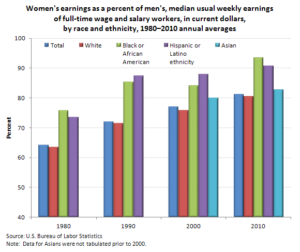 On Monday Nov. 28 PSI CHI, The International Honor Society in Psychology and the Students Women Center, hosted a Women’s Salary Negotiation Workshop, aimed to empower females to bridge the wage gap through effective salary negotiation techniques.
On Monday Nov. 28 PSI CHI, The International Honor Society in Psychology and the Students Women Center, hosted a Women’s Salary Negotiation Workshop, aimed to empower females to bridge the wage gap through effective salary negotiation techniques.
Professor Denise Miller of Queens College’s Business and Liberal Arts Program (BALA) was the speaker for the workshop. Miller has over 22 years of experience in business and entrepreneurship.
“I went into business as the only minority woman—you took what people gave you. I was taught that nice girls don’t push back, they take what’s offered,” she said.
Women make 78 cents on the dollar compared to men, and stand to lose up to 2 million dollars over the course of their career from not negotiating salary upfront.
“I never really negotiated, when it came time for me to really start, I began to look at younger women and what they did,” she said.
Stating that women need to negotiate differently in order to be accepted, Miller presented her thoroughly researched plan on salary negotiation for women.
To begin, she explained that one must have a clear idea of what they want going into negotiation. Whether about salary, health care, or parental leave, Miller encouraged women to know what they want, and look outside of immediate, obvious things they can ask for.
“If you could negotiate to work two days from home, wouldn’t you take it?” she asked.
Miller also pointed out that women don’t feel comfortable negotiating. Surveying all the women who attended the workshop, it was unanimous that negotiating was not a favorable task.
“When you are uncomfortable doing a behavior, you tend not to do it, and you’re not good at it,” she said.
However, she reminded that negotiating is something we do everyday. From negotiating with parents, siblings, or over price, we come into contact with the strategy more than we realize. She advised one way to improve negotiation skills are to practice them whenever you can.
“Except for grades, don’t do it with grades—I don’t advise that!” she added.
Providing four steps to negotiate, the first is to assess if you should negotiate. “Think about the influence you have, and in what way. Weigh your benefits and what it will cost you. What will happen if you lose?” To this she answered, “Nothing! It’s not going to hurt you necessarily to lose, there is little in this life that is not negotiable.”
The second step is to prepare. “Understand both sides. Know your interests, what it will take, and know your counterpart.” Miller said. “Know when you can negotiate more, and what you want to do.” She also explained the importance of doing research, as learning information allows you to prepare a stronger message.
The third step is to ask, as it is important to understand that being in a position with the chance to negotiate means there should be no fear.
“Always remember, when you are in a salary negotiating you got that far because there is something they want. You have a unique perspective, that’s why people are talking to you. If you were not unique, you would not be in a place to negotiate.”
“Don’t be afraid to ask,” she added, stating that women negotiate for more than just a salary, but rather their futures.
Miller also noted that one should negotiate with their companies’ interests in mind. “A win-win negotiation is where you look at an issue and determine what you want, but in order to negotiate effectively, you need to determine what the other person wants. The person you are negotiating with is not your enemy. You need to consider what’s important to them as well, and what they want,” she said.
The fourth step of negotiating is to package. “Group items together. You may take the lower salary, but get the chance to work at home, or maybe even a car. Learn the perks of business,” Miller said. “They are wanting to get much from their company to you. You can find a way to give it to them, and they’ll feel they won, and you did too.”
Miller also suggested Dr. Margaret Neale’s video “Negotiation: Getting What You Want,” on YouTube, which helped her gather information for the workshop.














